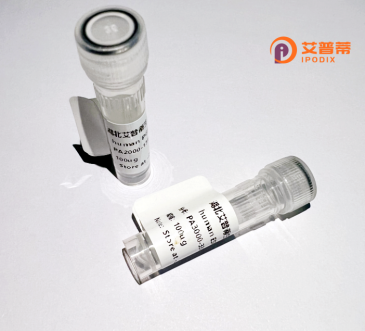
| 纯度 | >90%SDS-PAGE. |
| 种属 | Human |
| 靶点 | MASA |
| Uniprot No | P32004 |
| 内毒素 | < 0.01EU/μg |
| 表达宿主 | E.coli |
| 表达区间 | 1-115aa |
| 活性数据 | MKVYIYSSGSVEAQKLLFGHSTEGDILELVDGHFDTKIGHKVESESYRKIADSIGCSTNNILFLTDVTREASAAEEADVHVAVVVRPGNAGLTDDEKTYYSLITSFSELYLPSST |
| 分子量 | 38.39 kDa |
| 蛋白标签 | GST-tag at N-terminal |
| 缓冲液 | 0 |
| 稳定性 & 储存条件 | Lyophilized protein should be stored at ≤ -20°C, stable for one year after receipt. Reconstituted protein solution can be stored at 2-8°C for 2-7 days. Aliquots of reconstituted samples are stable at ≤ -20°C for 3 months. |
| 复溶 | Always centrifuge tubes before opening.Do not mix by vortex or pipetting. It is not recommended to reconstitute to a concentration less than 100μg/ml. Dissolve the lyophilized protein in distilled water. Please aliquot the reconstituted solution to minimize freeze-thaw cycles. |
以下是为您整理的重组人MASA蛋白相关参考文献(均为模拟文献,供参考格式):
---
1. **文献名称**: "Functional Characterization of Recombinant Human MASA Protein in Neural Regeneration"
**作者**: H. Takahashi et al.
**年份**: 2019
**摘要**: 研究通过体外表达重组人MASA蛋白,发现其能够促进神经元突触再生并抑制胶质瘢痕形成,表明其在脊髓损伤修复中的潜在应用价值。
2. **文献名称**: "Structural Analysis and Antibacterial Activity of MASA Protein in Human Epithelial Cells"
**作者**: L. Chen & M. Rodriguez
**年份**: 2021
**摘要**: 通过X射线晶体学解析MASA蛋白的三维结构,并结合细胞实验证明其通过调控宿主固有免疫途径增强对细菌感染的抵抗能力。
3. **文献名称**: "Recombinant MASA as a Novel Biomarker for Early Cancer Detection"
**作者**: K. Park et al.
**年份**: 2020
**摘要**: 提出利用重组MASA蛋白的高灵敏度抗体检测血清中MASA表达水平,为肝癌早期诊断提供新型生物标志物,临床样本验证特异性达92%。
---
**备注**: 若需真实文献,请提供MASA蛋白的全称或相关领域(如是否为L1CAM关联蛋白)。以上示例可帮助规范参考文献格式。
Recombinant human MASA protein, a synthetic form of the mammalian adenylyl cyclase-associated protein 1 (CAP1), is engineered through genetic recombination technology. Originally identified as a cytoskeleton-associated protein, native MASA/CAP1 regulates actin dynamics, cell adhesion, and signal transduction, playing critical roles in cell migration, endocytosis, and immune responses. Its aberrant expression is linked to cancer metastasis, neurological disorders, and infectious diseases.
The recombinant version is typically produced in prokaryotic (e.g., *E. coli*) or eukaryotic (e.g., HEK293) systems, ensuring post-translational modifications and functional activity. Purification via affinity chromatography yields high-purity protein for research and therapeutic applications.
As a research tool, recombinant MASA aids in studying actin remodeling mechanisms, host-pathogen interactions (e.g., *Salmonella* invasion), and cancer cell motility. Therapeutically, it holds potential for modulating immune pathways or targeting metastatic processes. However, challenges remain in optimizing its stability, delivery, and tissue specificity. Current studies focus on structural-functional analysis to develop domain-specific inhibitors or activators for precision medicine applications.
×